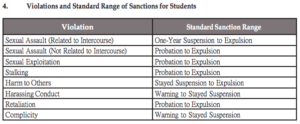By Alex Pinsk || Co-Opinion and Editorials Editor

On October 4th, F&M hosted its annual Forum on Sexual Misconduct. This forum is an event for faculty to inform students about school policies and for students to ask questions regarding those policies. Sitting on the panel were Jan Masland: Title IX Coordinator, Dean Hazlett: Dean of the College, and Pierce Buller: General Counsel. The panelists each individually explained their roles in the process and defined sexual assault and Title IX for the audience.
Generally, I would say the purpose of this forum was to be informative. We were provided with many hard facts with regard to sexual discrimination, such as how one might go about filing a complaint, who on campus is a mandated reporter, and statistics about consent, hearings, sanctions, etc. Overall, I did come out of the forum with more information than I came in with, especially concerning the legal piece involved. However, there were definitely portions of the forum that left me concerned.
Of particular interest to the student body seemed to be the trial process and the distribution of sanctions. According to the school’s policy, when an incident is brought to trial, there are three possible outcomes of said trial. The alleged perpetrator could be deemed “responsible,” “not responsible,” or it could be noted that there is “insufficient evidence for finding responsibility.” None of these instances provide specific sanctions. In other words, if a student is found guilty of rape, the rapist is not automatically (or necessarily) expelled from F&M. The administrators explained that one has to take in mind the conditions involved—in other words, each incident is circumstantial. F&M cannot, apparently, produce a list of sanctions for various acts of sexual assault and misconduct because a list like that could potentially get the college sued. However, the panelists seemed to contradict themselves, saying first that the school does not follow any chart when issuing sanctions and saying later that the F&M basically follows Dickinson’s list of sanctions that can be found on the Dickinson College website.
Following the information piece of the forum, there was an extensive “Question and Answer” session. Students asked various questions, namely those regarding the school’s hesitance for expelling rapists and other proven perpetrators. One student asked why F&M seems to pride itself on being ahead in so many areas but is behind regarding sexual misconduct. The general feeling amongst the student body seemed to be frustration. While perhaps the administration cannot fix the obvious issues associated with assault, they have the greatest influence on amending the process. Barring legal obligations, Franklin and Marshall College is a private institution and, therefore, is not required to follow all education laws sanctioned by the state. It would be helpful if students knew precisely which laws were state-sanctioned and which laws F&M’s policies can depose.
While the forum was frustrating with regard to policies and sanctions, I, personally, was less concerned with those aspects than I was with who attended the forum. Statistically, there is a greater percentage of women who are affected by sexual misconduct than men. Yet, there were almost exclusively female students in attendance at the forum. If we are trying to prevent sexual assault on F&M’s campus, we must first educate students. Everyone should care—not just victims, not just the friends of victims.
As a school, F&M needs to go to greater lengths concerning sexual assault and misconduct. It is all to prevalent, and we seem to be getting so wrapped up in the legal issues that we fail to see the fatal implications that are to be involved if the school does not step up.
Sophomore Alex Pinsk is the Co-Opinion and Editorials Editor. Her email is mpinsk@fandm.edu.